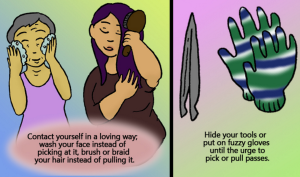
Source: The Doctor’s Channel
The “birds and bees” sex talk — a guardian passing on precious, heretofore unspoken wisdom in response to the onslaught of puberty — is often considered a rite-of-passage for Western adulthood.
And we all know how that storyline plays out, at least in the movies, right?
The kid groans outwardly, but inside, they cheer to be acknowledged as a maturing being. The guardian awkwardly shifts their eyes, but inside, they’re pleased to know they’re keeping their kid safe, that they’re acknowledging their child’s evolving reality.
And usually, this all happens on an assumed common ground of gender and sexuality that seems to help such conversations go smoothly — well, as smoothly as talking about sex with adults can ever be when you’re a teen.
Guardians — and this can include parents, mentors, and even sex education instructors — have traditionally defaulted to describing sex with heterosexual, penis-meets-vagina language. And they’ve usually assumed their audience is cisgender.
In other words, most “first time” talks make some pretty major assumptions: that everyone in the room desires the same kinds of sex acts (or desires sex acts at all), possesses certain body parts or shapes, and identifies with the gender they were assigned at birth.
This can be a quick recipe for discomfort for lots of sex-talk recipients, including queer people, asexual people, abstinent people, and those who simply think sex is more than penis-plus-vagina.
But it also has its own particular wrinkles for transgender folks — who may additionally identify with any of the previous traits, as well.
Since I identify as a transgender man, I’m going to center the rest of my thoughts on trans men here and hopefully open space for trans women to talk about their own gender-specific experiences.
From such a vantage point, I can honestly say: Most out trans boys, trans men, and trans masculine people I know receive inadequate, if not wholly non-existent, sex talks.
Their guardian fumbles with gender, pronouns, body parts, or partners. Further, the boy or man himself might have internalized shame about his trans body and consequently find it difficult to talk.
Or maybe his first “first time” has already come and gone — but his gender transition has prompted the need for an all-new sex talk that encompasses his maleness.
So, I’ve asked myself, what are some key things a trans man needs to know before diving into sex for the first time? Why are they important? And what social messages have kept other trans men from knowing them?
Let’s take a look at some facts worth memorizing.
1. Trans Male Bodies Are Sexy
TV, movies, books, and mainstream media tend to desexualize trans men and our bodies.
We receive subtle and overt messages that we are, by default, unattractive and are consistently exposed to implications that trans men are inadequate sexual partners.
For example, trans men rarely see ourselves reflected in entertainment as the romantic or sexual lead.
Moreover, the few times trans men are acknowledged as sexy in mass media, the messaging tends to be problematic in several ways.
First, we often receive the message that trans men only become attractive when others cannot “read” our trans histories on our bodies.
This message is so pervasive that even we, trans men, at times, perpetuate “passing pressure” — the need to have strangers assume we’re cisgender by obtaining an ideal body shape and masculinity — by policing each other’s looks.
Second, the media only considers particular types of trans male bodies worth consideration, and these tend to fit a cultural ideal: youthful, thin, muscled, able-bodied, traditionally masculine, and quite often, white.
Third, men who have not undergone genital reconstruction are often told, in subtle ways, that we are undesirable through our possession of body parts considered “too womanly” or through our lack of parts that seem to render us “not man enough.”
But the truth is, you are desirable and worthy whether other people assume you’re cisgender or not, whether or not you fit into the tiny box of what society deems “hot,” and with whatever genital shape you posses.
Your trans body is beautiful, whether or not it is fat, elderly, disabled, hairy, scarred, unreconstructed, readably trans, feminine, Black, or brown.
Before your first time, take a moment to identify where all those negative messages are coming from, and remind yourself that they are often rooted in the stigma and lack of knowledge that surround trans people in mainstream culture.
They have very little do with real flesh-and-blood trans men and very much to do with society’s preoccupation with gender norms, heterosexuality, white dominance, and phallocentrism. Which brings me to…
2. Sex Is More than Cisgender Penis-Plus-Vagina Sex and Penetration
Cisgender male phalluses — commonly referred to as “penises” — are revered in patriarchal societies.
At birth, doctors assign a privileged gender status (“male”) to all babies who appear to posses one (even though many are actually trans women and trans feminine nonbinary people).
Further, having a penis, some believe, justifies men satisfying their sexual desires in whatever ways possible, even sometimes through coercion or force.
And erections — via their ability to penetrate others’ body parts — are considered a sign of and strength and “real” manhood.
Combine this with society’s heteronormativity (the dominance and privileging of heterosexual relationships), and it’s no wonder many people perpetuate the belief that the only real sex trans men can have is by penetrating a vagina, and that our presumed inability to do this (via our lack of an official “penis” at birth) renders us incomplete or inadequate lovers.
Reality check: These ciscentric narratives are all stories that have been passed around so many times, and so far back in history, that we have a hard time seeing them for the social constructions that they are.
Possession of the body part mainstream society deems a “penis” does not make a man more or less worthy or adequate as a sexual partner.
There are all kinds of sexual acts — including oral sex, touching, and the use of toys or prosthetics — that can either be non-penetrative or involve penetration with something other than a penis. None require the presence of any particular sexual organ.
Indeed, we trans men can identify as queer, gay, bisexual, pansexual, asexual, heterosexual, or any other orientation under the sun.
Moreover, it’s totally acceptable and very common for trans men to either know we were born with a penis that simply doesn’t fit society’s definitions (for instance, the body part society commonly referred to as a “clitoris”), work towards having the penis we desire through surgical reconstruction, or feel complete with no parts we’d personally consider a penis.
3. You Have the Right to Have Your Gender and Body Respected 100%
Most trans men have experienced, at some point, other people perceiving them as “female.” I’ve found that within our patriarchal society, this assumption has often been accompanied by a damaging subtext: You are not in control of your own body or how others relate to it.
This is the same message that our female-identified counterparts, both trans and cis, receive daily, and which countless trans men have internalized and continue to carry shades of within them even after publicly identifying as male.
And it’s only further compounded by cisgender people who objectify us with invasive questions and request for access to our “unusual” anatomy.
This has resulted in many of us feeling like we don’t have the right to speak up and say what we need in sexual relationships, including the use of proper pronouns, the correct names for our body parts, which body parts are on- and off-limits, and the ways in which we like to be touched.
Instead, we self-silence and manage others’ expectations of us by trying to please them no matter what or by avoiding the awkwardness that can sometimes ensues when we demand to be referred to, and have our bodies handled, in ways that feel affirming to our genders.
Before your first time, be clear with your partner on your name, pronouns, and desires.
Take the time to ask yourself: What words for my body parts feel good? What feels invalidating? What parts of my body am I ok with others seeing? Touching? What forms of touching am I comfortable with? What other sexual acts am I okay with doing?
Many trans men choose to wear a shirt or chest binder during their first time; many others wear a soft prosthetic “packer” or a harness and dildo on their lower half. Many are comfortable with full or partial nudity, and many do not use prosthetics.
Many men have words or nicknames for their hard parts, like “dicklit,” “click,” or “dick,” as well as names for their soft parts, like “bonus hole,” “mangina,” or “man cave.” Others are comfortable with anatomical words like “penis” or “vagina.”
Remember: Mutually pleasing sex is all about communication.
So after you do this thinking, communicate your boundaries with your partner. Be open to hearing their boundaries too, but know that if they insist that they’d be most comfortable misgendering you or engaging in a sexual act that feels uncomfortable, you have the right to say “no.”
4. Your Health Is Always a Priority
Being a member of a gender minority means we often get told, in so many ways, that we aren’t worthy of love or proper care.
This is only compounded when our trans status becomes layered with multiple minority identifiers, including race, sexuality, size, ability, age, and citizenship.
All trans people are susceptible to something called minority stress: chronically high levels of stress and the accompanying health risks that come from being constantly stigmatized, ignored, or deemed “less than” by the majority.
For trans men, minority stress may, at times, emerge from physical threats, and seems to most consistently come from a lack of seeing healthy, lovable trans men reflected back to us by popular culture.
We often see so few positive depictions of trans men around us that we can internally start to lose our sense of self-worth.
These feelings invisibly build up inside of us, often ultimately coming out through depression, isolation, and potentially risk-taking behaviors, such as self-harm, excessive drinking and smoking, drug-use, unsafe driving, engaging in unhealthy relationships, and deprioritizing our sexual health.
While these things might make us feel better during moments of distress, they eventually bode poorly for our overall health.
In other words: We, as trans men, may feel a particular inclination to engage in risky sex, which includes unprotected sex or sex with strangers. We may do it to feel loved or desirable, to take our minds off our troubles, or to momentarily feel a high.
For your first time, are you considering risky sex? Are you going in without protection (which can includes condoms, dental dams, and birth control)? Have you stopped to think about this first, and maybe even about why you feel the need to do so?
If you can, take time beforehand to read up about STI and HIV prevention if that’s a value that you hold. If you are considering the type of sex that could make you pregnant, consider whether that’s what you want first, and then openly discuss your decision with your partner.
Otherwise, research birth control methods (note: being on testosterone alone does not necessarily count) to find one that feels right for you. Bring protection along with you, rather than assume your partner will have it.
***
Trans men, like all people, deserve to have a fulfilling, safe, healthy sex life should we desire one. We are worth it (and don’t let anyone tell you differently).
But society — and even our loving guardians — doesn’t give us many resources to turn for information. And many of us struggle to give ourselves permission to ask.
So consider this an invitation to start disentangling negative social messages about trans male bodies from your own personal sex life — but definitely not the end of your exploration.
After all, every sex talk is meant to be only the first lesson in each of our personal, lifelong classes on sex, sexuality, and pleasure.
Know another trans man who’s thinking about having sex for the first time? Chances may be that he hasn’t yet received a trans-inclusive sex talk. So pass this along and maybe even chat — it could be good for you both!
[do_widget id=”text-101″]
Mitch Kellaway is a Contributing Writer for Everyday Feminism and queer, biracial, transgender reporter, writer, and assistant managing editor for Transgress Press. He is the co-editor of Manning Up, an anthology of personal narratives by trans men. In addition to covering trans news for Advocate.com, Mitch’s writing has appeared in the Lambda Literary Review, Huffington Post, Mic, and Original Plumbing magazine, and has been published in several journals and anthologies including Jonathan: A Journal of Queer Men’s Fiction, Cliterature, RE*COG*NIZE: The Voices of Bisexual Men , Man the Yards, and Best Sex Writing 2015. He holds a degree in gender studies from Harvard University and lives with his wife in Somerville, MA. He can be reached at MitchKellaway.com or @MitchKellaway. Read his articles here.
Search our 3000+ articles!
Read our articles about:
Our online racial justice training
Used by hundreds of universities, non-profits, and businesses.
Click to learn more




















